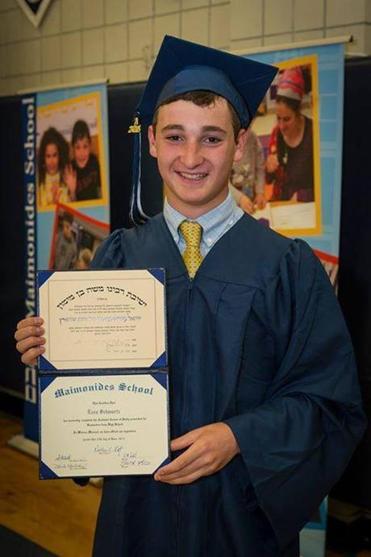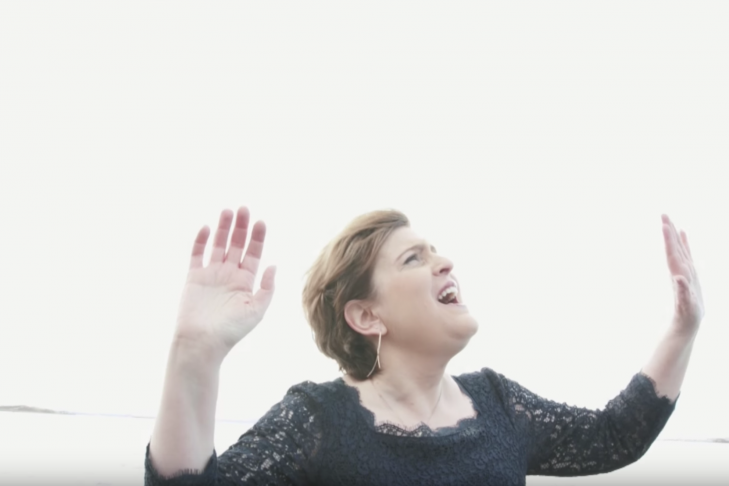When Rebecca Teplow first heard about Ezra Schwartz’s tragic death, she sank into a chair for several hours trying to absorb the news. Teplow, a New Jersey resident and classical singer and composer of Jewish liturgical music who once studied violin with Itzhak Perlman, knew she somehow had to honor Schwartz’s memory.
Eighteen-year-old Schwartz, a 2015 graduate of Brookline’s Maimonides School, who was from Sharon, was spending a gap year in Israel. He had just visited a memorial for three Israeli boys murdered in the summer of 2014 and was on his way to deliver food to soldiers near the West Bank settlement of Efrat when a Palestinian terrorist gunned him down last November.
Although Teplow did not know Schwartz or his family personally, she felt connected to him. Like Schwartz, her college-age daughter was also spending a year studying at a yeshiva in Israel. Coincidentally, one of Teplow’s voice students was Ezra’s first cousin. She became aware of the connection when she received a text message canceling the girl’s voice lesson with her to attend his funeral. “Something about the text hit me so hard,” Teplow said in an interview with JewishBoston.
The day of Ezra’s funeral, Teplow attended the annual dinner for the Zionist Organization of America, where her husband is the art director. She couldn’t sit through the evening and left to watch Ezra’s funeral online. Later that same night she was on a plane to Israel for a planned visit to her daughter. On the flight, Teplow took out a list of liturgical words she had intended to use to write a commissioned song, but instead she began composing “Avinu Shebashamayim (God in Heaven),” her musical memorial to Schwartz.

“The ‘Prayer for the State of Israel’ jumped out at me as the song I was going to write in Ezra’s memory,” she said. “The words to the prayer to give a living memorial to Ezra and victims of terror in Israel feel right. The words also beg God to help watch over Israel, which is all we can do.”
Teplow, 51, attended the Yeshivah of Flatbush and went on to study music at the High School of Performing Arts, the same high school depicted in the movie “Fame.” The move was highly unusual for a modern Orthodox young woman, but her parents were supportive. She remained Orthodox and channeled her musical talent into singing and composing sacred music. She released two CDs in 2004 and 2008; the latter combined her classical music background with her distinctive take on spirituality.
Teplow said: “When I’m composing a piece, I feel the meaning of the words. I do not have an intentional awareness of my musical technique because I try to enter the holiness of the words. The musical techniques mirror and reflect the deeper meaning of the words.”
Those techniques are on display in Teplow’s poignant music video for “Avinu Shebashamayim.” “When you listen to the [actual] words, avinu shebashamayim, you hear that they are interjected toward the middle and end of the song and at the climax of musical phrases,” she explained.
In the video, which has garnered nearly 4,000 views on YouTube, Teplow performs her song against a backdrop of the sea on a gray, melancholy day. She recalled that during the taping there was a sudden windstorm. “But when I sang the Hebrew words for ‘God, send your light and truth,’ the sun suddenly came out,” she said. “It was surreal. People have noticed the correlation to the Hebrew. They are also moved by the raw emotion I express in it. It gives them a connection to Ezra.”
As an Orthodox woman, Teplow has grappled with the issue of kol isha. Literally translated as the “voice of a woman,” the phrase points to the traditional prohibition of hearing a woman sing in public. Teplow explained that there are a few Orthodox rabbis who permit a woman to sing before an audience if the lyrics are drawn from scripture. “I feel so connected to what I’m saying,” she said, “that when I sing my music it is a vehicle to connect people to God. So how can it be wrong? If men don’t want to watch [the video], they don’t have to watch it. This shouldn’t be an Orthodox women’s issue.”
Teplow does not know if the Schwartz family is aware of her musical tribute. Her student’s mother, however, was moved by Teplow’s song. “She said she was going to personally send it to them,” Teplow noted. “She was so moved. She expressed a lot of gratitude.”
This post has been contributed by a third party. The opinions, facts and any media content are presented solely by the author, and JewishBoston assumes no responsibility for them. Want to add your voice to the conversation? Publish your own post here. MORE



